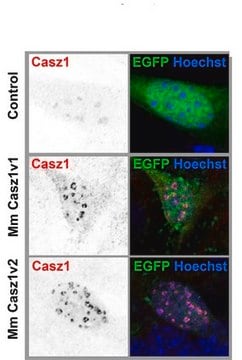AB10556
Anti-mGluR8 Antibody
serum, from guinea pig
Synonym(s):
glutamate metabotropic receptor 8, glutamate receptor, metabotropic 8
About This Item
Recommended Products
biological source
guinea pig
Quality Level
antibody form
serum
antibody product type
primary antibodies
clone
polyclonal
species reactivity
rat
species reactivity (predicted by homology)
mouse (based on 100% sequence homology), chimpanzee (based on 100% sequence homology), bovine (based on 100% sequence homology), human (based on 100% sequence homology), dog (based on 100% sequence homology), monkey (based on 100% sequence homology)
technique(s)
immunohistochemistry: suitable
NCBI accession no.
UniProt accession no.
shipped in
wet ice
target post-translational modification
unmodified
Gene Information
human ... GRM8(2918)
Related Categories
General description
Specificity
Immunogen
Application
Neuroscience
Neurotransmitters & Receptors
Quality
Target description
Physical form
Storage and Stability
Handling Recommendations: Upon receipt and prior to removing the cap, centrifuge the vial and gently mix the solution. Aliquot into microcentrifuge tubes and store at -20°C. Avoid repeated freeze/thaw cycles, which may damage IgG and affect product performance.
Analysis Note
Rat brain lysate
Disclaimer
Not finding the right product?
Try our Product Selector Tool.
Storage Class Code
10 - Combustible liquids
WGK
WGK 1
Certificates of Analysis (COA)
Search for Certificates of Analysis (COA) by entering the products Lot/Batch Number. Lot and Batch Numbers can be found on a product’s label following the words ‘Lot’ or ‘Batch’.
Already Own This Product?
Find documentation for the products that you have recently purchased in the Document Library.
Our team of scientists has experience in all areas of research including Life Science, Material Science, Chemical Synthesis, Chromatography, Analytical and many others.
Contact Technical Service








